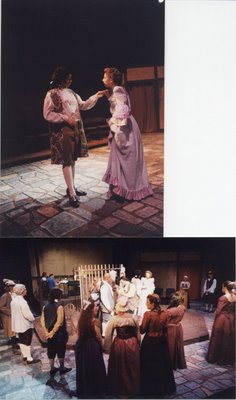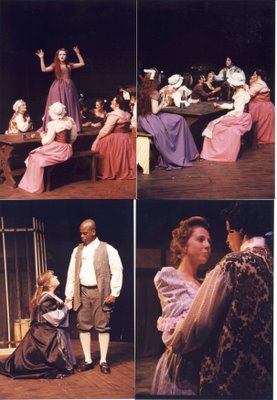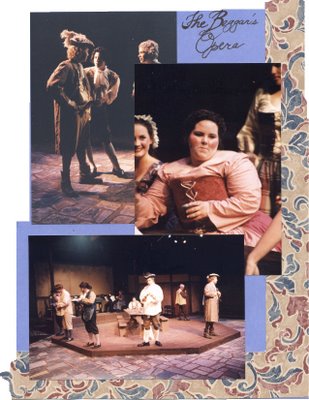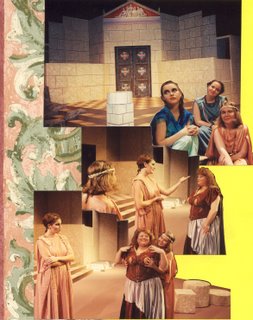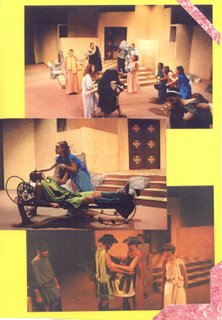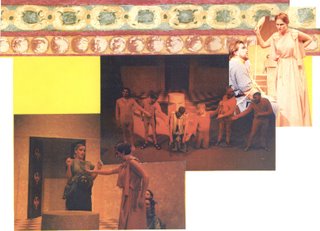There's an oddity to the chronology of a blog that's more than a little disconcerting. We're accustomed to reading a book from front cover to back cover, but someone stumbling into this story could very well begin with today's posting and be rather lost. So, if you have dropped in here by chance, please note that the title of this entry says "Four" and I advise you to go scroll down and begin at the Prelude. Sure, others might call it a "Preface" but I'm a bit musically inclined and I'm also influenced by August Wilson, the great African-American playwright, who so eloquently preaches the necessity of each of us finding "our song"...even painful tunes need to be heard. Down here in the South, we call that the Blues. And everybody's got those.I wish you were sitting here beside me so I could say these things rather than writing them. While some have decried the value of conversation with the observation "Talk's cheap," I'm here to tell you that the spoken word vanishes ... POOF! I say "it" and it's gone right out of my mouth. But the written word is tangible. I can touch the print. Words on paper have a life all their own. That's why I've encouraged others who been where I've been to get it out on the page where it cannot have nearly the same power you've given it in your head. Putting the inner life--the dialogue and the narrative--on the page makes the whole shooting match another creature entirely. You can take that new being and wad it up! You can tear it up! You can burn it, cut it, chew it...or put it away in a drawer and never look at it again. But you have to do something with it. Talk? You can deny you ever said such a thing. (I feel I'm falling into a distinctly Southern cadence here but that's what I am and, for today, it feels right not to deny it.)My wife just drew my attention to the New York Times. The newspaper picked up on a blog (The Lede) which noted a recent report in a psychiatric journal. A study has revealed 59% of victims of childhood sexual abuse suffer from clinical depression. The reactions in the comments section are predictable and might be summarized as follows "What took them so long?" Perhaps more shameful is the virtual lack of reportage concerning males as victims. I am thankful for the very few books that have been written on the subject. Michael Lew's Victims No Longer is a very painful, but terribly important, read.
The rest of this segment is very much
"Under construction"
so grammarians please exercise some patience.
A Great Gift: Sorry to have gotten off track. I am easily distracted, particularly when there's a task at hand that needs doing but I'd really rather not...oh, well. Other than feeling my father's penis under the covers, most of the memories surrounding my baby/toddlerhood were either pleasant or fairly unremarkable. I clearly remember the arrival of a crate from Belgium. Mom popped it open in the middle of the living room floor. It was evening. At first, nothing was visible except for excelsior, which might have been toy enough for a two or three year old. But mother moved her hand into the depth and drew out two toys that I still own today. There was a stuffed camel with a little metal button on his ear--not soft and cuddly like toys are today but highly detailed with cleft hooves. More wondrous than that, however, was the fully jointed mohair-furred teddy bear that growled when he was tipped back and forth. Just amazing! A couple of years later, I grew so attached to the bear that I believed him quite capable of growing his hair back if I were to give him a GI haircut just like mine. I suppose I happened to cut off his metal button tag that signified that he, like the camel, had been made by Steiff. I believe my mother cried a bit and told me what a lucky little boy I was. The only other thing I find remarkable about this memory is what I recognize as the effect of dissociation. I start out "in the child" and then I am outside looking on, first over Gary's shoulder, then a bit more distant as though I'm being pulled away by a shadowy figure. This very moment is a realization for me. Before now, I thought my first contact with a dissociative state had been later, when I was older and the abuse was overt. I have to take a break.
Initial Body Awareness: A walk around the block later and the burgeoning panic attack is diverted. This is why I am writing? Right? Right. As I said before, nothing else was particularly extraordinary. A girl roughly a year or so older lived next door and was my first childhood friend. Her name was Candy, although her parents called her "Hop-Along" after the popular cowboy star of the day. She liked wearing cowboy boots and a cowboy hat. She may have even sported a holster and a six-gun. But cowboys only went so far and maybe her parents were already trying to address her "tom-boyishness" and let her know that girls became nurses. I believe she had an older sister...or not. I'm not sure it matters except she was there when Candy tried to give me a shot with a thin piece of copper wire. I'd had enough of those already what with all the penicillin for those sore throats I'd had and I understood the routine. I dropped my shorts in the pup tent in her back yard. While she stuck me in the rear--ouch!--either she or her sister were more fascinated with my penis. It's my first memory of having an erection. It is a blissfully innocent memory.
The first appearence of "little people": The house on Cassel Drive in Kingsport was home to imaginary friends: Girlfriend, a nurse/fairy who made "green me'cind at the hopsital," and several ethnic chums named Een-Koo the Chinaman, Aji-Baba, Sho-Sho-Dee, and Van-Toon-Tin. My mother was an immigrant in Appalachia. You should expect diversity. I'm also quite certain that these boys weren't entirely products of my fertile imagination. I recall enjoying the story of the Chinese brothers (three? five?) and I also adored Ali-Baba and the Forty Thieves.
Dad and his family: My father worked...a lot. He owned an automobile trim shop--his mother taught him to operate a sewing machine. He managed a service station. If it had wheels, it held his interest. His businesses were in close proximity to the floral shop owned by his brother-in-law and sister, and his two older brothers lived several blocks away. The district was known as Highland. His parents lived in the area, too, across from the Model City Motel where "Grandmimi" worked before her first stroke. The family was nuclear with a capital "N." Mother was "from oversea" and, as we were to learn from neighbors years later, "Yvonne spent all of Charles' money" and "thinks she's better than everybody else." Warning: it's best not to let a foreigner in your midst. I have no other memories of my father during my first three years. Surely he was home...sometime. But his absence--physically and/or emotionally--had already become a pattern that he'd not explain until many years later. Frankly, I should offer up thanks for the moments of disclosure that did come in his later years. His "folk" were not demonstrative of affection or much else. My mother was a distinct contrast.
A Change of Location: I'd turned three when my father accepted a job in Bristol, twenty-five miles away from Kingsport by way of a curvy two lane highway. Apparently dad's old friend, Ron Hennerd, convinced him he had the right stuff to work as a new car salesman--on commission--at Ron's Ford, a sparkling new dealership on West State Street. Our house on Cassel Drive was put up for rent. I suppose dad had some idea of becoming like his brother-in-law who was snapping up rental property in Highand, a sideline that grew out of his floral business. Dad was planning on getting rich, not that I knew it then but he would admit it to me later. So we packed up and moved to #38 in the Lee Garden Apartments. From our second floor apartment, there was an amazing view of the Holston Mountains off in the distance. The complex was filled with young couples and families. Dad joined the Jaycees. He and Mom had their first arguments. I believe now that is how the "tiger" came into my bed in the first place. When a man gets kicked out of the master bedroom in a two-bedroom apartment, where's he going to go?
Mom's family: We weren't in the apartment long before Mom and I boarded an airplane bound for Belgium. Of our trip to New York for our departure, I recall sitting in the back seat of the car--a grey DeSoto--and "punishing" a stuffed animal I called Floppy. He was no more than a reddish corduroy pillow shaped like the face of a slack-jawed hound dog with long, Bassett-style ears. Of course, cars didn't have air-conditioning then, so I was holding Floppy out the window by his ears. I lost my grip and miles later, dad picked up on my whimpering and cursed every mile he had to double back along the Blue Ridge Parkway to pick my wayward friend. I don't remember any consequences. I do, however, recall being frightened of telling him what had happened. Years later, Mom would tell me that dad had been having an affair and the trip was intended as a cooling off period. She admitted that once we landed in Brussels, she gave serious consideration to cashing in the return tickets. But she was a proud woman who found it difficult to throw in the towel and we returned to America a couple of months later.
A Sibling Almost Arrived: We weren't back in the country long before Dad changed jobs and we moved one floor down and half a building over into #32. Dad apparently earned enough in commissions to purchase a new service station a block and a half down the street from Ron's Ford. Mom got very excited about decorating both the apartment and the station for Christmas. Mom became pregnant. Of course, I didn't know it at the time for pregnancy, like cancer, wasn't openly discussed then, at least not in front of children. But I remember coming back to the apartment one day after playing and a bunch of people were in the foyer of the building. Our neighbor across the hall, my "Aunt" Ginny snatched me by the wrist and took me into her apartment. I'd seen some blood on our apartment floor. "Your mamma's had an accident and I'm going to watch you until your daddy comes home." Mom had a miscarriage and there was considerable hemorrhaging. They'd carted her off to Bristol Memorial Hospital. Dad was going to have to keep watch over me at the service station. She was hospitalized for what seemed a very long time. "Thanks" to therapy, I now realize that during this time I was overtly abused.
The Big Moment That I Won't Remember For Years: There's not a great deal for a child to do at a filling station. I sat at the desk in the office and played with the adding machine. I doodled. I believe several evenings dad's mechanic took me home so I could play with his daughter. That was my first memory of having a fried bologna sandwich with mustard and Miracle Whip on white bread. I was put into Miz Bummy's kindergarten for the mornings. But my father had to tend to me in those uncovered hours. I did my best to stay out of his way. I was a good boy.
At some point, I needed to pee. I went out of the station to the men's restroom. I don't know if I lingered too long, but my father came in looking for me. He locked the door. The urinal was a "floor" model and he backed me right against the white porcelain. My polished Buster Browns were planted in my urine. He encircled my right wrist with his meaty hand and brought it against his fly...blue uniform pants. He instructed me to unzip him and pull out his penis. He didn't use nice words. He told me to put his penis in my mouth. He tells me that he's a real man. It's at this point in my memory that I fly away, right up against the ceiling and I can see the little boy Gary being used by the man. I can't go any higher or farther away although I desperately wish I could and the rest is blackness. Later, because "You've been a good boy" I'm given the money to buy a YooHoo chocolate drink from the outside refreshment stand near the restrooms on the side of the building. I come back to the desk. I open the center drawer. There's dad's pistol. I get in trouble again. I'm not as good as I think I am.
That's enough for today. I'll edit later.


